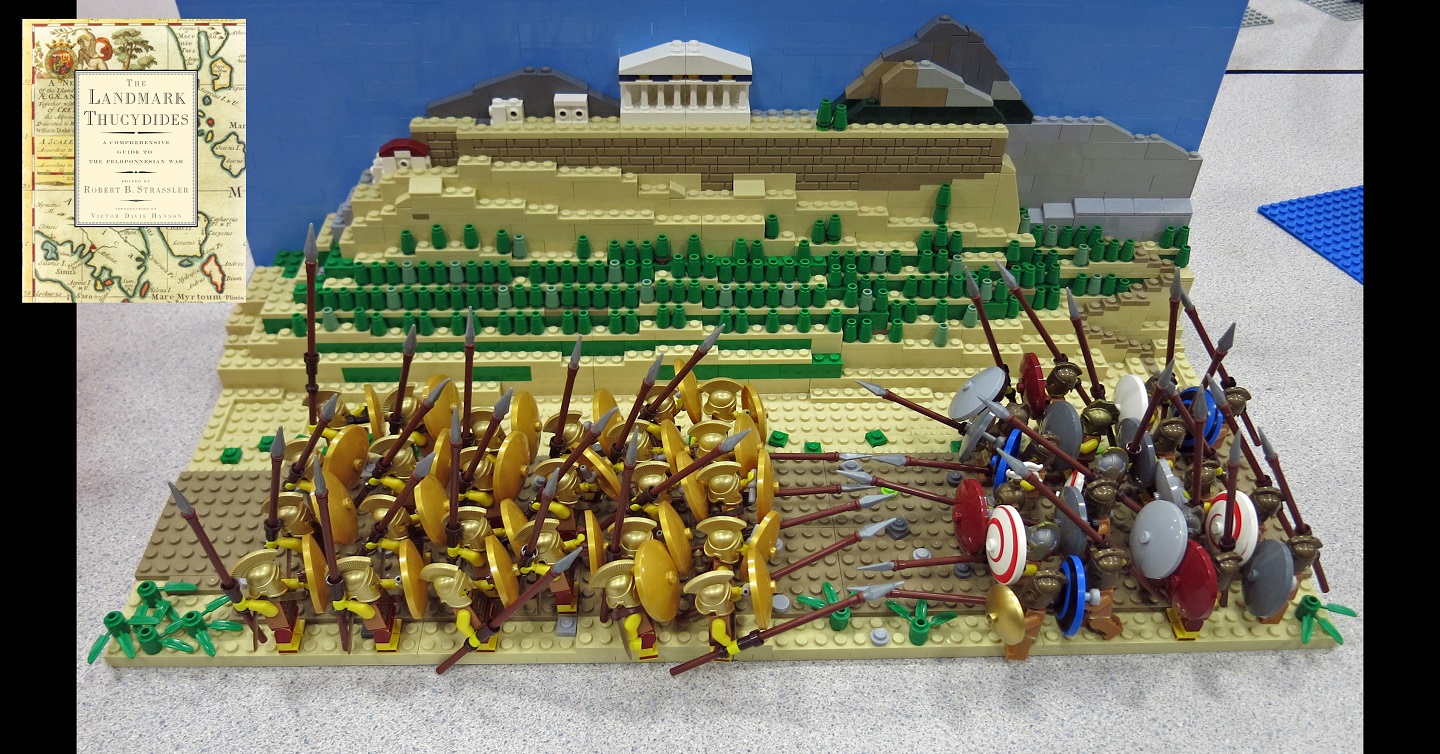

Authors’ Note: One of the hallowed rites of passage each year at the Army War College is reading portions of Thucydides’ 2500-year-old The History of the Peloponnesian War. Most students find it extremely worthwhile, some to their surprise. Many scholars regard The Peloponnesian War as the first work of international relations since it attributes agency to human actions rather than to the will of the gods. A deep reading of Thucydides also requires students to navigate between the opposing pitfalls of the use of history: cherry-picking evidence to come to simplistic “lessons” or giving up any hope of drawing insights from such a distant time. Of course, every year there are always one or two students who do not make the effort. The following is a satirical portrait of one such student’s not-so-careful read of history along with the response of a more discerning classmate. (All citations come from Robert B. Strassler’s translation The Landmark Thucydides.)
The following list was found on the backside of a stained Redd’s Barbeque take-out menu a day before oral comprehensive exams at the Army War College in two separate sets of handwriting–a short list from one student and commentary from another.
Ten Things I Learned by Skimming Thucydides
It’s the day before oral comp exams. While my gullible classmates have been busy rereading Thucydides, I skimmed the text (It’s only a lot of reading if you do it!) and to be on the safe side, rewatched the movie 300. From what I could gather by flipping through the book, these are the top ten lessons I’m taking into oral comprehensive exams from The History of the Peloponnesian War:
1. War is predictable, and anyone paying attention can see how it will turn out.
The Spartan king Archidamus, preparing to invade Attica, disagreed with this assessment, as does almost anyone who has fought in any war. As Archidamus argued, “The course of war cannot be foreseen, and its attacks are generally dedicated by the impulse of the moment; and where overweening self-confidence has despised preparation, a wise apprehension has often been able to make head against superior numbers.” (2:11). Any resemblance between Archidamus’ warning and the American invasion of Iraq in March 2003 and subsequent events in the Middle East is purely coincidental.
2. When a war is going your way, press your advantage to absolute victory.
After a major Athenian victory at Pylos in the seventh year of the war, Spartan envoys urged the Athenian Assembly to accept terms of an armistice that gave Athens much of what it wanted from the war: “You can now, if you choose, employ your present success to advantage, so as to keep what you have got and gain honor and reputation besides, and you can avoid the mistake of those who meet with an extraordinary piece of good fortune, and are led on by hope to grasp continually at something further, through having already succeeded without expecting it.” (4:17). That Athens did not take this good advice can be inferred from the fact that we are only about halfway through the book at this point; that Athens would never again be in such an advantageous position vis-a-vis Sparta will become clear below.
3. If you experience a tactical setback, send more troops until your policy is inevitably vindicated.
The Athenians’ Sicilian expedition, launched in 415 BC, was met with unexpected resistance. Undaunted by initial setbacks, Athens sent waves of reinforcements over the next two years (6:94). Despite the reinforcement, the expedition ultimately proved futile. Nearly all of the Athenians who participated in the expedition were either killed or captured. While historians disagree on the ultimate failure of the expedition, the incremental addition of forces gave the Spartans time to intervene in support of the Sicilians. Having lost the initiative, the additional forces were of limited value in securing an Athenian victory. There are certainly times when additional forces can make a difference in a conflict. During the First Punic War several centuries after Thucydides’ time, Rome’s willingness to look past its appalling losses and to continuously backfill soldiers and ships played an important role in its victory over Carthage. Similarly, the United States’ willingness to combine a troop surge with its newly minted counter insurgency strategy contributed to the defeat of Al Qaeda in Iraq. But merely sending more forces is no guarantor of success, as Athens learned firsthand.
4. Democracies are particularly good at formulating and implementing long term strategy.
The decision to invade Sicily, perhaps the most pivotal of the entire war, was contentious, with two leading citizens urging opposing strategies. Nicias was the strongest voice against the invasion while Alchibiades strongly supported intervention. Alchibaides carried the day, with Nicias’ argument that the invasion, would require many resources ironically ultimately increasing the cost of the defeat from survivable to catastrophic. Despite the likely cost, “Everyone fell in love with the enterprise. … With this enthusiasm of the majority, the few that did not like it feared to appear unpatriotic by holding up their hands against it, and so kept quiet.” (6:24) And so it began. While Athenagoras, popular leader of Syracuse, later disagreed with the contention that “democracy is neither wise nor equitable” (6:39), events in his own city would demonstrate that sometimes, democracies make mistakes–really, really big ones.
5. There is no downside to fighting a war of attrition.
From the beginning Athens understood that it could not defeat Sparta in a land war. Instead, the great Athenian leader Pericles proposed relying on a combination of naval power and strong city walls to prevent Sparta from forcing Athens to surrender (2:13). This strategy, by its very nature, precluded a quick and decisive victory. Consequently, the conflict would degenerate into a war of attrition. The long and costly struggle weakened Athens and created an opening for the Persians to intervene on behalf of Sparta. There are times a war of attrition is unavoidable. Planning which relies on siege tactics will inevitably take their toll on soldier and citizen alike.
6. Political infighting can only make a civilization stronger.
Thucydides described Pericles as a leader who “by his rank, ability, and known integrity, was enabled to exercise an independent control over the multitude—in short, to lead them instead of being led by them; for as he never sought power by improper means, he was never compelled to flatter them, but, on the contrary, enjoyed so high an estimation that he could afford to anger them by contradiction.” When Pericles perished in the great plague of 430, there was no clear successor whose stature and integrity united the disparate factions of the assembly (Ekklesia) through the inevitable setbacks Athens would experience in the war. The bitter struggle to command a majority in the assembly led to inconsistent policies which made the defeat of Sparta all but impossible (2:65).
7. Multiple commanders of a single military operation will smooth everything out.
Responding to a request from the Segestans, the Athenians debated whether to send a force to Sicily. Nicias was the strongest voice against the invasion, while Alchibiades strongly supported intervention. The Athenians ultimately voted in favor of invasion, and split command among the doubter Nicias, the proponent Alchibiades, and the old warhorse Lamachus. The three commanders recommended three different strategies, ultimately compromising on one that failed utterly; see below. (6:50)
8. If you have control of the sea, victory in a land war is assured.
Athens was the greatest naval power of the ancient world, powerful enough to forward deploy ten thousand hoplite troops and thirty thousand oarsmen across 800 kilometers to Sicily. However, a series of bad tactical decisions made by a gaggle of commanders cost them dearly. “They were beaten at all points and altogether; all that they suffered was great; they were destroyed, as the saying is, with total destruction, their fleet, their army, everything was destroyed, and few out of many returned home. Such were the events in Sicily.” (7:87)
9. The moral rightness of your cause is more important than your military strength in war.
In perhaps the most famous passage from The History of the Peloponnesian War, the Athenians implore the people of the island of Melos to surrender to them despite the Melian’s arguments that they have no quarrel with Athens and have right on their side. The Athenians are underwhelmed by the Melian dialogue, noting that “the strong do what they can while the weak suffer what they must” (5:89), and after a siege “put to death all the grown men whom they took, and sold the women and children for slaves” (5:116). God tends to be on the side that has the biggest battalions, not the most noble cause.
10. There are no enduring principles of international relations, and we have nothing to learn from the ancient past.
Thucydides begins his work by hoping that it will be useful to “those inquirers who desire an exact knowledge of the past as an aid to the understanding of the future which in the course of human things must resemble if it does not reflect it.” Hence, he wrote this book “not as an essay which is to win the applause of the moment, but as a possession for all time” (1:22). The fact that it is still being read (or skimmed) and debated more than two millennia later is prima facie evidence that his analysis of human nature, power, and international relations still has relevance today.
My faculty advisor assures me that citing these lessons during oral comp exams will make an indelible impression on the evaluation board and perhaps even alter the trajectory of my career. While those who have carefully read Thucydides may take issue with one or two of the above assertions, history is subjective, and my take on the text is just as valid as that of every other reader. Yeah, I’m going to crush these comps. Much like attacking Syracuse, what could go wrong?
If you want to fail oral comps by relying on Hollywood to discern historical lessons, that’s your business. At least pick the right war. The movie 300 is a fictional account of the Battle of Thermopylae during the Second Persian invasion of Greece. The Peloponnesian War takes place nearly fifty years later during an intra-Greek struggle for political dominance. You might as well derive lessons from World War Two by reading a fictional account of the Spanish-American War. Good luck tomorrow. You’re going to need it.
John Nagl is an Associate Professor of Warfighting Studies at the U.S. Army War College.
Matthew Woessner is Professor of Institutional Research at the U.S. Army War College.
The views expressed in this article are those of the author and do not necessarily reflect those of the U.S. Army War College, the U.S. Army, or the Department of Defense.
Photo Description: The Peloponnesian War in Lego® by Sean Edmison
Photo Credit: Photo by wiredforlego via flickr Attribution-NonCommercial (CC BY-NC 2.0)





The key to passing the Comps…levity and understanding tragedy. 😉
I tell anybody I know that’s struggling with Thucydides that “Sicily is Vietnam.” Then they look at me as if a light suddenly went on, thank me profusely, and go about their merry way. Because very little about Great Power Competition changes that much over time . . .
From the October 23, 2005 New York Times article “A War Like No Other: Where Hubris Came From” by Paul Johnson. (Johnson here reviewing Victor Hanson’s then-new book “A War Like No Other: How the Athenians and the Spartans Fought the Peloponnesian War”):
“Athens as America
Contemporary America is often now seen through the lens of ancient Athens, both as a center of culture and as an unpredictable imperial power that can arbitrarily impose democracy on friends and enemies alike. Thomas Paine long ago spelled this natural affinity out: ‘What Athens was in miniature, America will be in magnitude.’ Like ancient Athenians, present-day Americans are often said to believe that ‘they can be opposed in nothing,’ and abroad can ‘equally achieve what was easy and what was hard.’ Although Americans offer the world a radically egalitarian popular culture and, more recently, in a very Athenian mood, have sought to remove oligarchs and impose democracy — in Grenada, Panama, Serbia, Afghanistan, and Iraq — enemies, allies, and neutrals alike are not so impressed. They understandably fear American power and intentions while our successive governments, in the manner of confident and proud Athenians, assure them of our morality and selflessness. Military power and idealism about bringing perceived civilization to others are a prescription for frequent conflict in any age — and no ancient state made war more often than did fifth-century imperial Athens.
So great were the dividends of envy, fear, and legitimate grievance against the ancient world’s first democracy that the victorious Peloponnesians who oversaw the destruction of the Long Walls of Athens — the fortifications to the sea symbolic of the power of the poor and their desire to spread democracy throughout the Aegean — did so to music and applause. Again, most Greeks concluded that, as Xenophon wrote, Athens’ defeat ‘marked the beginning of freedom for Greece’ — without a clue that the victorious Sparta would move immediately to create its own overseas empire in the vacuum.
Blinkered idealists in America who believe that the world wishes to join our democratic culture might reflect that at the outbreak of the Peloponnesian War, ‘the general good intentions of people leaned clearly in favor of the Spartans’ and that ‘the majority of Greeks were deeply hostile toward the Athenians.’ . . . “
Mistake! The above item appears to be a October 23, 2005 New York Times quote from the first chapter of the then-new Victor Hanson book “A War Like No Other: How the Athenians and the Spartans Fought the Peloponnesian War.”
From the New York times article above: “Military power and idealism about bringing perceived civilization to others are a prescription for frequent conflict in any age — and no ancient state made war more often than did fifth-century imperial Athens.”
From this such perspective — offered by Victor Hanson above — might we see:
a. The Soviets/the communists — in the Old Cold War of yesterday — attempting to “bring civilization to others;” this, (a) threatening those who derived their power, influence and control from the status quo, thus, (b) causing these such threatened folks to stand hard — culturally and otherwise — against the Soviets/the communists back then? And:
b. The U.S./the West — in the New/Reverse Cold War of today — attempting to “bring civilization to others;” this, (a) threatening those who derive their power, influence and control from the status quo and, thus, (b) causing these such threatened folks to stand hard — culturally and otherwise — against the U.S./the West today?
(Back in colonial times, also, this such “civilizing mission = war” conflict paradigm was present, for example, as described in my two quoted items below?:
“Where the cultural backwardness of a region makes normal economic intercourse dependent on colonization, it does not matter, assuming free trade, which of the ‘civilized’ nations undertakes the task of colonization.” [See the first paragraph of Joseph Schumpeter’s 1919 “State Imperialism and Capitalism.”]
“Small wars are a heritage of extended empire, a certain epilogue to encroachments into lands beyond the confines of existing civilization and this has been so from the early ages to the present time. The great nation which seeks expansion in remote quarters of the globe must accept the consequences. Small wars dog the footsteps of ‘the pioneers of civilization’ in the regions afar off.” [The quotes around ‘the pioneers of civilization’ above are mine. See Chapter II — “the Causes of Small Wars” — in C.E. Callwell’s book “Small Wars: Their Principles and Practices.”])
Thanks for sharing the awesome post.